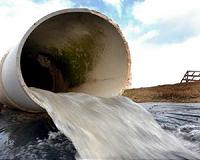| . |  |
. |
Jerusalem (AFP) July 21, 2010 An environmental group on Wednesday called for a halt to baptisms in the Jordan River where tradition holds that Jesus was baptised, saying the waters there were dangerously polluted. "Friends of the Earth Middle East call on regional authorities to halt baptism in the lower Jordan River until water quality standards for tourism activities there are met," said a statement from the group. The group issued the call following media reports that Israel's health ministry had urged the tourism ministry to stop people bathing in the river, saying it posed a health risk. In recent years the flow of the river has slowed to a dirty trickle as fresh water running into the river has been replaced with sewage. "Sadly, the lower Jordan River has long suffered from severe mismanagement with the diversion of 98 percent of its fresh water by Israel, Syria and Jordan and the discharge of untreated sewage, agricultural run-off, saline water and fish pond effluent in its place," the statement said. The ministry could not immediately be reached for comment. The Israeli site, known as Qasr al-Yehud, is a closed military area near the West Bank city of Jericho. In recent years the army, under pressure from the tourism ministry, has opened it to pilgrims on special occasions. Nearby, on the east bank of the river in Jordan, is Wadi Kharrar. It was found by archaeologists in 1996, and the Jordanians say it is the biblical "Bethany Beyond the Jordan" where John the Baptist exercised his ministry. Excavations there began in 1997 after the redeployment of Jordanian troops who had controlled it when it was a mine-infested no-go zone until a 1994 peace treaty with Israel. Jordan and Israel each claim that the true baptismal site is on their territory, competing to build hotels and facilities to attract tourists and pilgrims. Jesus is believed to have entered the waters some 2,000 years ago to be baptised by John, who immersed his followers in the Jordan to symbolise their purification in the eyes of God.
earlier related report The aid comes as Pakistan has been grappling with massive power and water shortages. In a news conference with Clinton Monday, Pakistani Foreign Minister Shah Mehmood Qureshi said Pakistan faces electrical outages of 6 to 8 hours in urban areas and 10 to 12 hours in rural areas, noting that the country's economic growth has been adversely affected. In a separate conference Monday on Pakistan's energy policy, Shafqat Kakakhel, former U.N. assistant secretary-general, said Pakistan lost more than $6 billion across various sectors in 2008 due to load shedding and a shortage of energy. The seven projects in the U.S. aid package include the Gomal Zam and the Satpara dams, each to provide 17.4 megawatts of power. Feasibility studies announced under the program include smart grid and distribution modernization, a biomass-fueled boiler, a 50-megawatt wind farm and solar photovoltaic power systems for hundreds of private schools. The U.S. aid also includes assistance in identifying and developing the country's natural gas resources with the aim of providing long-term security for power plants. The United States will also work with Pakistan to improve the country's legal, regulatory and fiscal policies to attract more investment. The initiatives represent Phase II of the U.S. Signature Energy Program for Pakistan, the first part of which Clinton announced during her visit to the country last October, awarding $125 million for six projects. The projects are to be implemented by USAID, the U.S. Trade & Development Agency, the U.S. Geological Survey and the U.S. Department of Commerce. In its strategic dialogue document prepared in advance of Clinton's visit, Islamabad had positioned the country's water crisis as a top concern. Clinton rejected Islamabad's request for help in solving water disputes with neighboring India, however, maintaining that it must first manage its own resources before seeking mediation from outside. "Pakistan has to get control of the water you currently have, because if you go to a mediation body and say water is being diverted, the first response will be you are not efficiently using the water you have," she said during a television interview in Islamabad. Pakistan has one of the world's most extensive systems for irrigation and transportation of water, Clinton added, but it has "been neglected and fallen into disuse." She called for the country to take action to address the situation.
Share This Article With Planet Earth
Related Links Water News - Science, Technology and Politics
 Stormwater Model To Inform Regulators On Future Development Projects
Stormwater Model To Inform Regulators On Future Development ProjectsRaleigh NC (SPX) Jul 20, 2010 North Carolina State University researchers have developed a computer model that will accurately predict stormwater pollution impacts from proposed real-estate developments - allowing regulators to make informed decisions about which development projects can be approved without endangering water quality. The model could serve as a blueprint for similar efforts across the country. "The mode ... read more |
|
| The content herein, unless otherwise known to be public domain, are Copyright 1995-2010 - SpaceDaily. AFP and UPI Wire Stories are copyright Agence France-Presse and United Press International. ESA Portal Reports are copyright European Space Agency. All NASA sourced material is public domain. Additional copyrights may apply in whole or part to other bona fide parties. Advertising does not imply endorsement,agreement or approval of any opinions, statements or information provided by SpaceDaily on any Web page published or hosted by SpaceDaily. Privacy Statement |